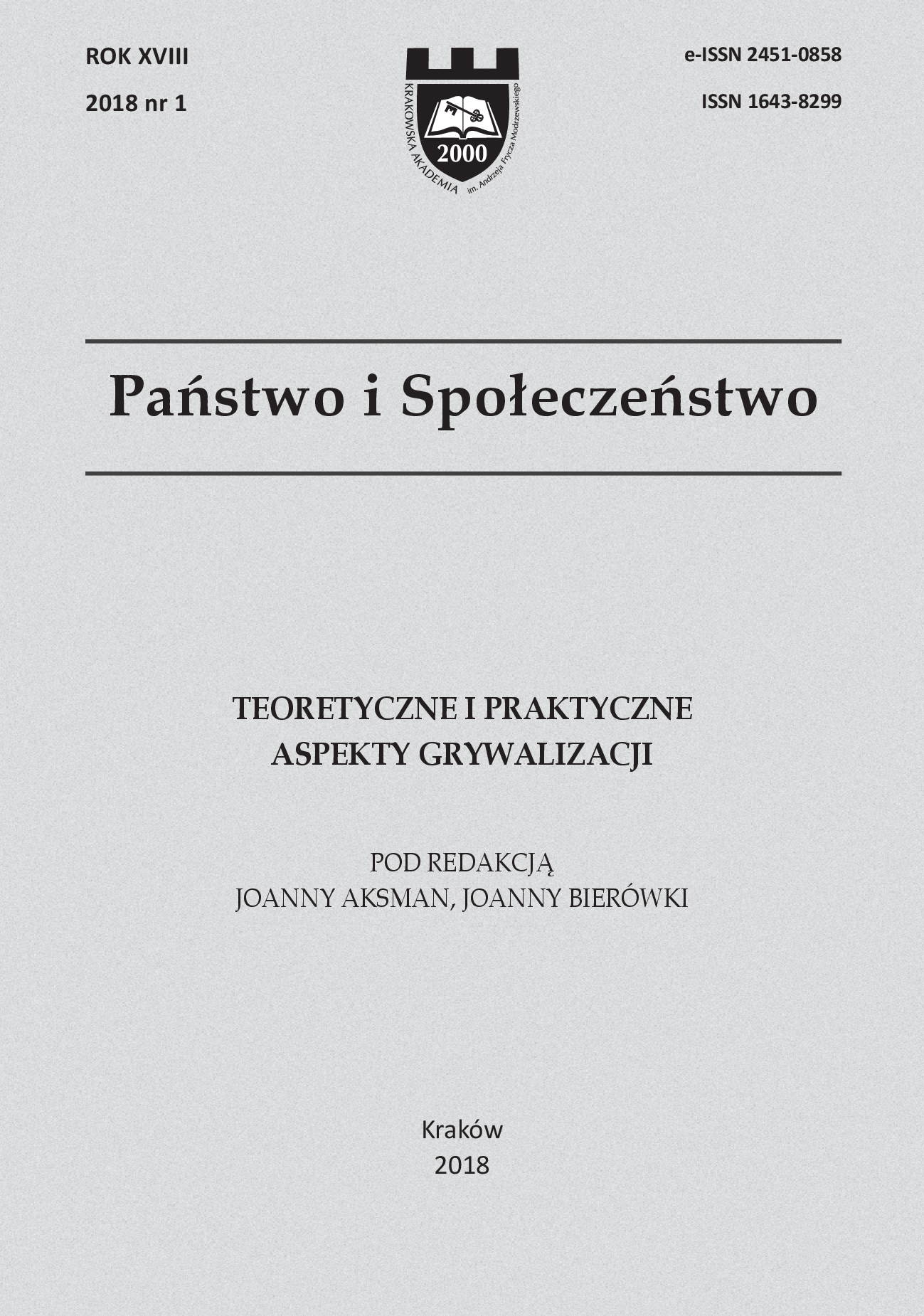
We kindly inform you that, as long as the subject affiliation of our 300.000+ articles is in progress, you might get unsufficient or no results on your third level or second level search. In this case, please broaden your search criteria.

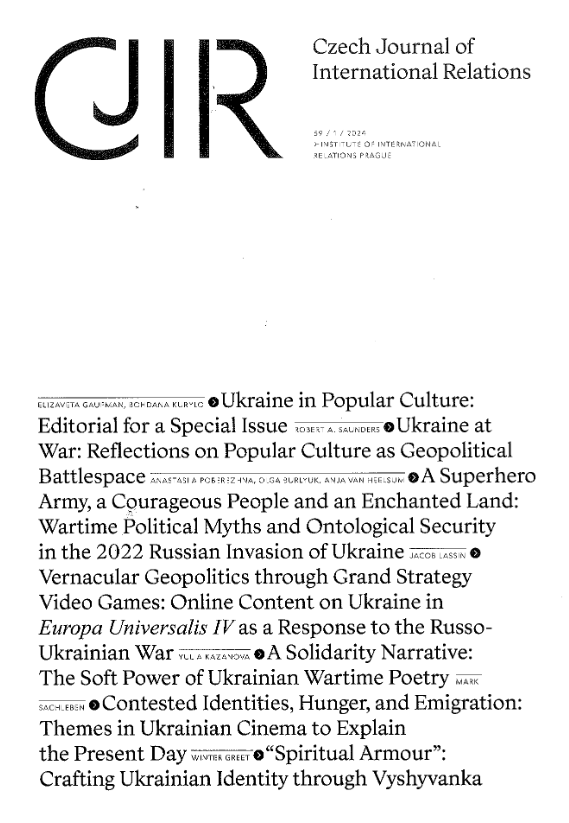
Europa Universalis IV, (better known as EUIV), is a popular grand strategy PC game. Players choose a country to play as and start in the year 1444 with the option to plot new courses in history such as allowing players to form Ruthenia, the game’s version of Ukraine. In this article, I investigate how both Ukrainian and non-Ukrainian online content creators have been making content related to Ruthenia and Ukraine as a response to Russia’s February 2022 invasion of Ukraine. I highlight how this content allows creators and viewers to voice their opinions on the war, build a sense of solidarity with the Ukrainian military, debate issues related to the war, and raise money for Ukrainians in need. Through close readings of this content, I offer an analysis of how this community uses the game to build a "vernacular geopolitics" in which information about and understandings of international relations and conflicts develop in non-elite settings.
More...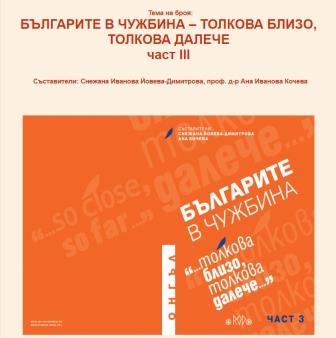
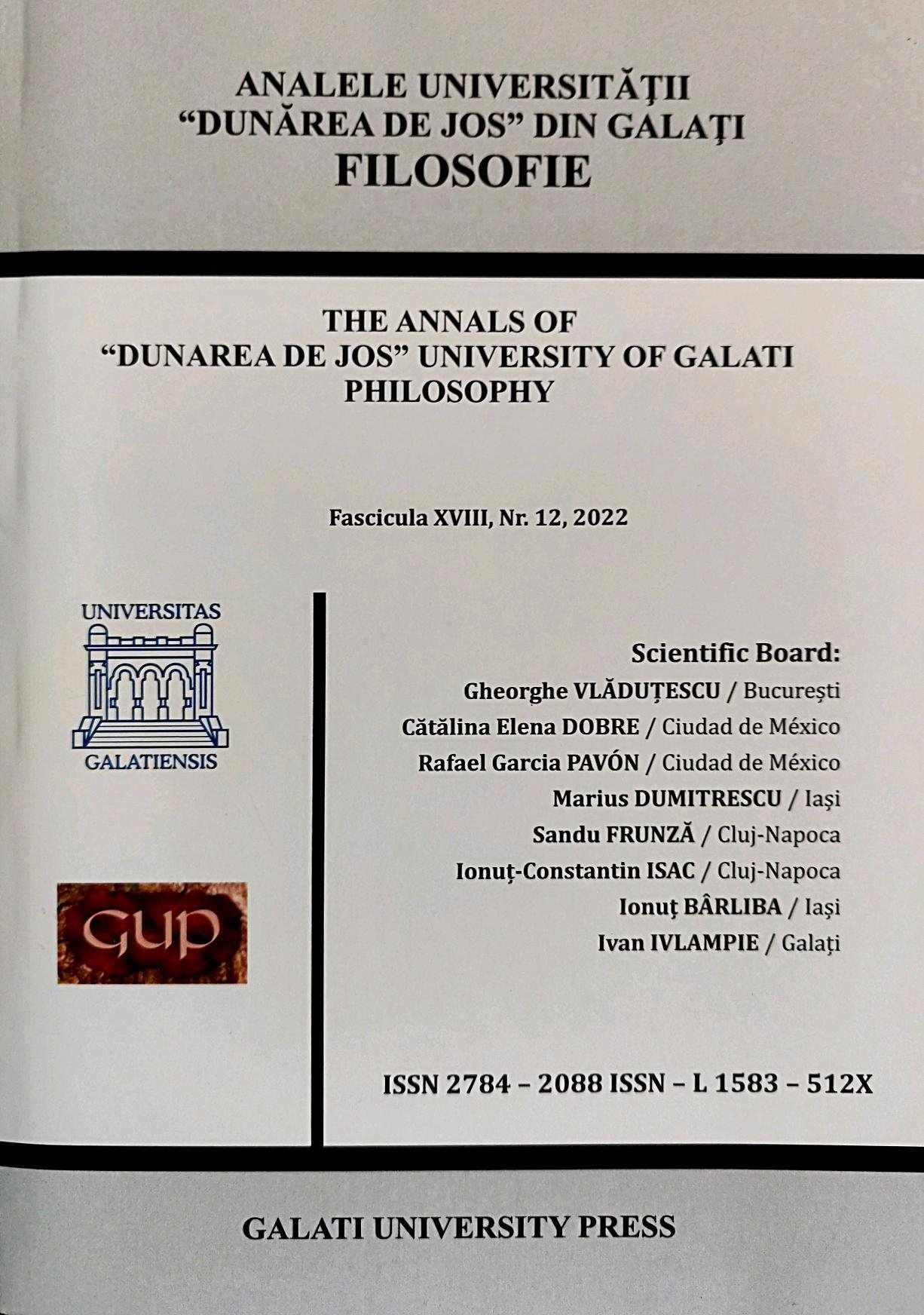
The book Homo ironicus explores the anthropological dimension of irony, starting from philosophical questions – Who are we, who are our ancestors, how deep are our origins – questions asked by every curious individual about their own genealogy, but which are especially the major questions of humanity. In this second case, the spectacle of the searches and answers is fascinating.
More...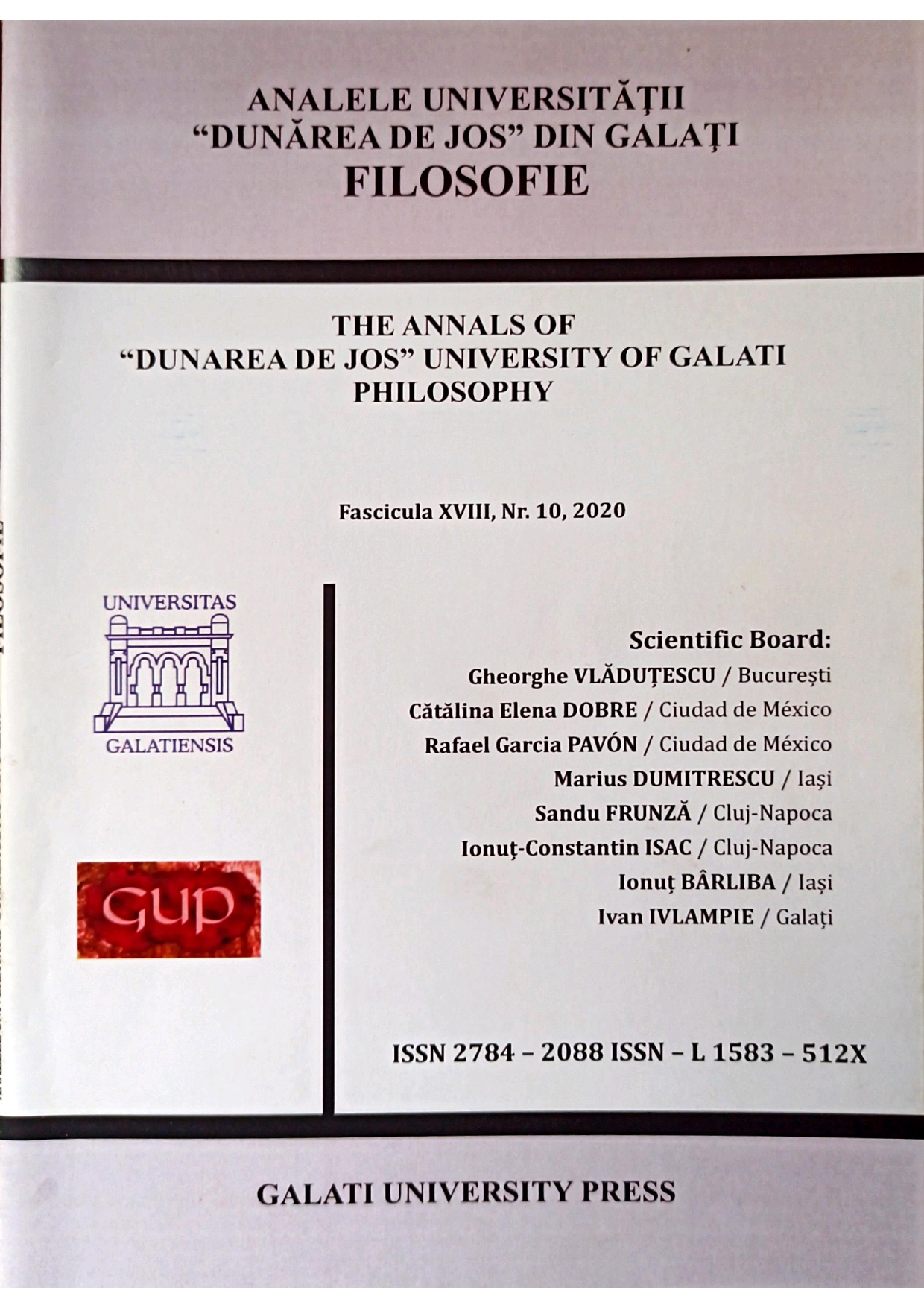
The central premise of Karl Marx's work, Capital, boils down to the idea that the employer's profit comes from his employee's unpaid labor. The value of goods delivered to the market is exclusively determined during the working hours of the workers. The capitalist's profit is an unjust and immoral social fact. The entrepreneur does not make any physical or intellectual effort in the production process of goods or services in his field of activity, but only spends his energy squeezing the profit. As a social parasite, he deserves to be eliminated through the communist revolution from humanity's history. Throughout this study, we argue against this ideological perspective on history.
More...
The purpose of the paper is to ascertain when non-territorial autonomy (NTA) arrangements are a morally appropriate response by states to various minority claims, given possible alternatives. As such, it is not about the relationships between minorities and majorities, but minorities and the state. The two main questions are: (1) What are the criteria of moral appropriateness? (2) When are any of the alternatives morally appropriate? Methodologically speaking, it makes sense to start from the most difficult of the alternatives to justify secession because it represents the most extreme possible claim of a minority towards a state, or even against a state. Once such a criterion or set of criteria is established, the criteria for other alternatives can only be reasonably lower, and the criteria for secession will be indicative of what these lower criteria could be.
More...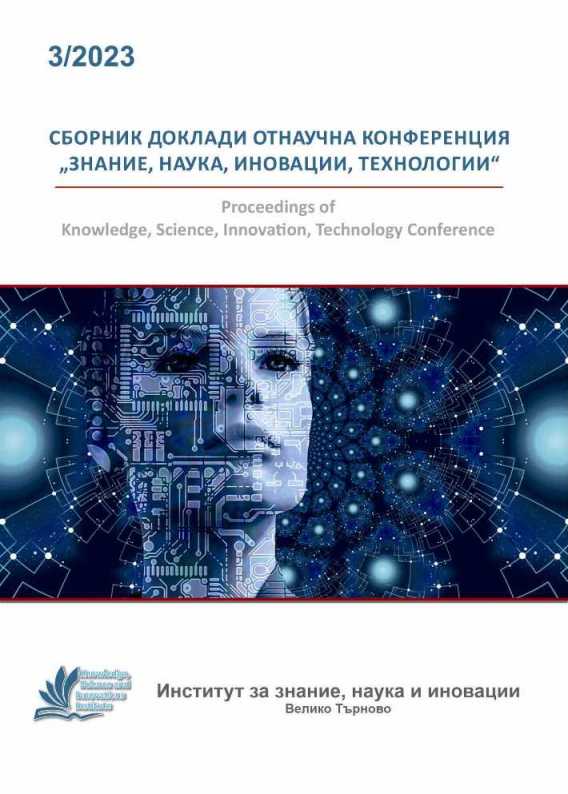
Romantic philosophy and aesthetics provide a fertile ground for the development of the angelic element, which became a part of the conceptual journeys of the creators of the era. Drawing upon stereotypical notions of angels, Juliusz Słowacki, the most „romantic” and mystical among the three Polish poet-prophets (alongside Adam Mickiewicz and Zygmunt Krasiński), offers his creative „interpretation” of this celestial being. The aim of this study is to stylize the symbolic spectrum of the angel and provide a concise overview of its evolution in the works of the Polish poet and epistolographer. To achieve this goal, comparative, semantic-analytical, and interpretative methods have been employed.
More...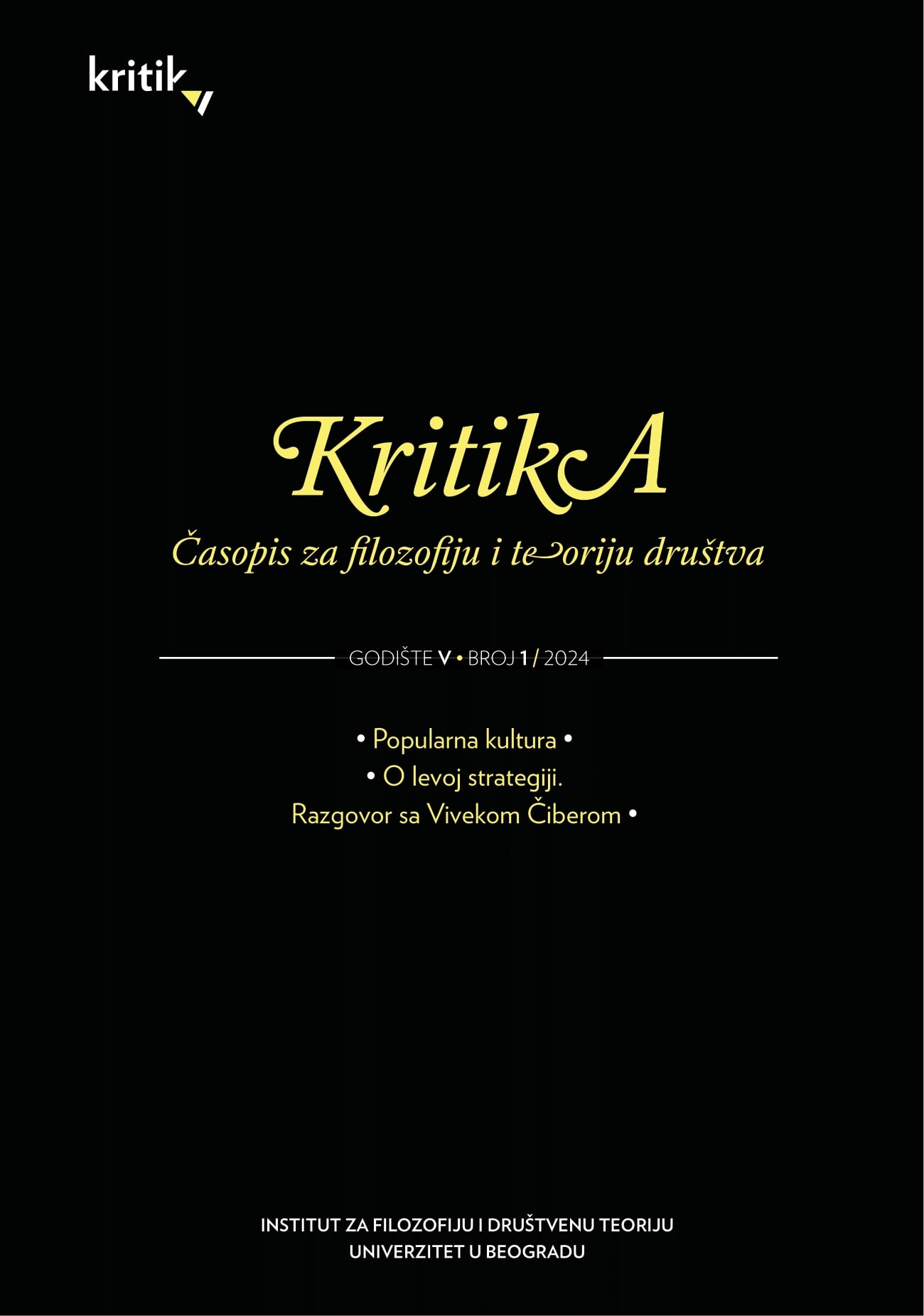
The capitalist market system of post-industrial society gradually encompasses all social relations as it subsumes the entirety of social and cultural realms under its profit-making logic. Music is also deeply immersed in economic transformations of society and is a significant determinant of youth identities and style. In this study, we analyze the origin and characteristics of trap folk music and gaser style among young people in Serbia and the former Yugoslav region. In order to better understand the peculiarities of the new music genre and the style associated with it, we primarily analyze the importance of commodification and the cultural industry. Methodologically based on a qualitative analysis of popular trap folk songs, visual representation and slang among the most popular trap folk artists, our study points to the presence of global consumer culture and political apathy among young people in the Balkans, which also reflects the formation of fluid identities without visible authenticity and deeper meaning. Despite the apparent absence of political resistance, we conclude that class affiliation is an important determinant of the emerging gaser style and identity, which is not the case in post-subcultural sociological discussions about youth subcultures.
More...
The recent social developments in Serbia have established a new model of political monopolies and an effective return to the one-party regime. Such absence of alternatives in the official political sphere provokes three basic forms of resistance: complete disillusionment with the political system and its major exponents which results in political abstinence; mass protests in response to concrete instances of abuse of political power and informal cultural initiatives which communicate political messages through the critique of the politicisation of the cultural sphere. In this paper, the case study for this form of political resistance is the independently produced, low-budget music festival Fesram (Festival sranje muzike or Festival of Crap Music), active between 2012 and 2019, which at the same time challenged the political and cultural systems in the country, and their respective core values. The introductory part of the article situates Fesram in the context of the existing forms of political resistance to the currently dominant political regime. The second part discusses the concept of „bad music“ in the Serbian cultural context, its history and academic treatment (or lack thereof), and its wider cultural and political implications. The third part discusses Fesram, its background, and practices. The fourth part discusses Fesram’s manner of dealing with the cultural stereotypes prevailing throughout Serbian history and the perceived absence of social criticism in Serbia’s official cultural sphere. In the concluding part Fesram is observed as a form of „discreet activism“ resorted to in circumstances in which other forms of political resistance seem to fail. Without permanent funding, venues or a fixed time-frame, Fesram changed its dates and locations, spontaneously responding to current goings-on in Belgrade and Serbia, and communicated with its audiences mainly through its Facebook page. Playing with ideological opposites, confronting them in „outrageous“ combinations (musical, verbal and visual) Fesram invited its audiences to critically (or even un-critically) distance themselves from the extreme poles of the political spectrum. Although it parodied characters from the official political and cultural spheres and mocked the language of tabloid media and the prevailing political jargon, Fesram did not align with any established political option, inviting its audience to think beyond the existing political system and question the society’s core values. Fesram was not didactic: it communicated exclusively by annoying anyone who failed to receive its messages. And Fesram’s probably most important message is that Serbian society has nurtured false cultural values and associated political doctrines for far too long and that it has only itself to blame for the condition it has found itself in. This erratic music festival had not only shaped an alternative form of activism, but a new type of „activist citizen“ who understands the meaning of „crap“ (whether in music, culture, politics or society in general) and the importance of this understanding. Fesram also showed that political resistance goes hand in hand with resistance to the cultural values propelling political action.
More...
This essay is part of the ongoing cultural project “Figure it Out: The Art of Living Through System Failures”. Figure it Out involves cultural organizations Drugo More (Rijeka, Croatia); Kiosk (Belgrade, Serbia); La Labomedia (Orléans, France); Unfinished Foundation (Malta); Vektor (Athens, Greece); artist collectives ŠKART (Belgrade, Serbia); RYBN.org (Paris, France); and !Mediengruppe Bitnik (Berlin, Germany); and researchers Mara Ferreri, Valeria Graziano, Marcell Mars, Tomislav Medak. Partners will work with and engage different communities sharing their stories through art productions, exhibitions, a radio festival, bonfire events and web-zines. The project is supported with funding from the European Union, the Ministry of Culture and Media and the Government Office for Cooperation with NGOs of the Republic of Croatia.
More...
The aim of this paper is to shed more light on the relationship between Foreign Direct Investment (FDI) and job quality in the Republic of Serbia from a Post-Keynesian perspective. The research findings indicate that the dominant role of foreign capital in shaping the institutional framework of the national economy, coupled with a generous foreign investor subsidy policy, has not led to the anticipated improvements in the quality of the Serbian labour market. These results are interpreted in the context of the extensive role assigned to FDI in the Serbian economy. Consequently, public policymakers, when faced with the dilemma of choosing between competing macroeconomic objectives achievable through foreign capital inflow, often do not prioritize job quality as a key determinant in formulating policies towards foreign investors.
More...
U nastavku predstavljamo tekst razgovora o knjizi Daniela Markovića, koji je održan na Institutu za filozofiju i društvenu teoriju, 10. maja 2023. godine. Daniel Marković predaje Klasične nauke na Univerzitetu u Sinsinatiju. Njegov istraživački rad obuhvata polja grčke i rimske retorike, filozofije, i poezije, sa posebnim osvrtom na način na koji ova tri sistema oblikuju obrazovne tekstove u antici. Objavio je radove o Lukreciju (uključujući i knjigu o Retorici objašnjenja u Lukrecijevom spevu O prirodi (The Rethoric of Explanation in Lucretious’ De rerum natura, Brill 2008), Vergiliju, pseudo-Vergilijevoj Etni, Horaciju, Marcijanu Kapeli, grčko-rimskoj retoričkoj teoriji i grčko-rimskom filozofskom protreptiku. Njegova knjiga Promocija nove vrste obrazovanja: Grčko-rimski filozofski protreptik (Promoting a New Kind of Education: Greek and Roman Philosophical Protreptic, Brill 2022) analizira grčka i rimska ohrabrenja na filozofiju kao prve tekstove zapadne književnosti koji sistematski razmatraju pitanje krajnjeg cilja obrazovanja. Trenutno priprema komentar na Ciceronov teoretski spis De partitione oratoria. Pored autora, učesnici razgovora bili su vanredna profesorka Sandra Šćepanović i redovni profesor Darko Todorović sa Odeljenja za klasične nauke Filozofskog fakulteta Univerziteta u Beogradu, zatim viši naučni saradnici i filozofi Igor Cvejić i Predrag Krstić sa IFDT-a, naučni saradnik i filozof Ivan Nišavić sa IFDT-a, naučna saradnica i filozofkinja Tamara Plećaš sa IFDT-a, i istraživačica saradnica i pedagoškinja Milica Sekulović sa IFDT-a. Razgovor je moderirala Tamara Plećaš. Struktura seminara bila je sledeća. Učesnici su bili podeljeni u dva bloka, a profesor Marković je imao priliku da odgovori na pitanja i komentare učesnika nakon svakog bloka pitanja/komentara. Uvodna reč prepuštena je profesoru Markoviću.
More...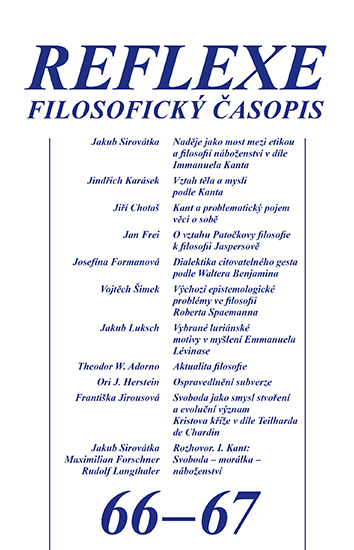
The paper discusses Kant’s distinction between appearances and things in themselves, phenomena and noumena, and the problem of affection. The difference between appearances and things in themselves is understood as a methodological difference between two manners in which an object can be viewed: either as an appearance, or as a thing in itself. The author claims that this double-aspect view is a consequence of Kant’s conception of space and time as a priori forms of sensibility. The difference between phenomena and noumena, on the other hand, cannot be explained only by the double-aspect view; Kant understands it also as an ontological difference between two different kinds of objects. The paper concludes with a discussion of the problem of affection. The author claims that this problem is a pseudo-problem if we understand the difference between appearances and things in themselves as double-aspect view. Kant had maintained only an empirical affection. Passages in which Kant seems to advocate a transcendental affection can be brought in line with Kant’s critical philosophy.
More...
Interview with Vivek Chibber by Janko Stefanović and Miloš Janković.
More...
The paper presents some common motifs of two thinkers who, despite a historical gap of several hundred years, had common roots in the tradition of Judaism. The notion of the Encounter, as analysed by Emmanuel Levinas, and the cosmogonic process of Creation in Isaac Luria’s system of thought have a common motif in the phenomenon of the socalled “contraction” (Hebrew: tzimtzum). Despite the fact that for the first thinker it is the domain of ethics and for the second the domain of ontology, the act of a certain “self-limitation” or “withdrawal” plays in both cases a foundational role.
More...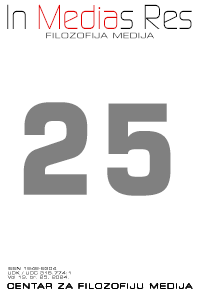
The idea of the text is to question the similarities and differences between the concepts of gesamtkunstwerk and multimedia. These are terms that presuppose the search for a new form of unification of artistic forms, at different times and in different ways. The key thinker (and artist) of gesamtkuntwerk or that orientation is the composer Richard Wagner. The theoretician who was at the crossroads of the worlds of traditional art and the contemporary technical sphere was Walter Benjamin. He begins a new line of writing about art, which is supported by theorists such as Marshall MacLuhan, Vilem Flusser, Friedrich Kittler, Jean Baudrillard, Dona Harway, Lev Manovich and Maurizio Lazarato. The text will present the idea of gesamtkunstwerk and compare it with some of the views of theorists who accepted or rejected this idea.
More...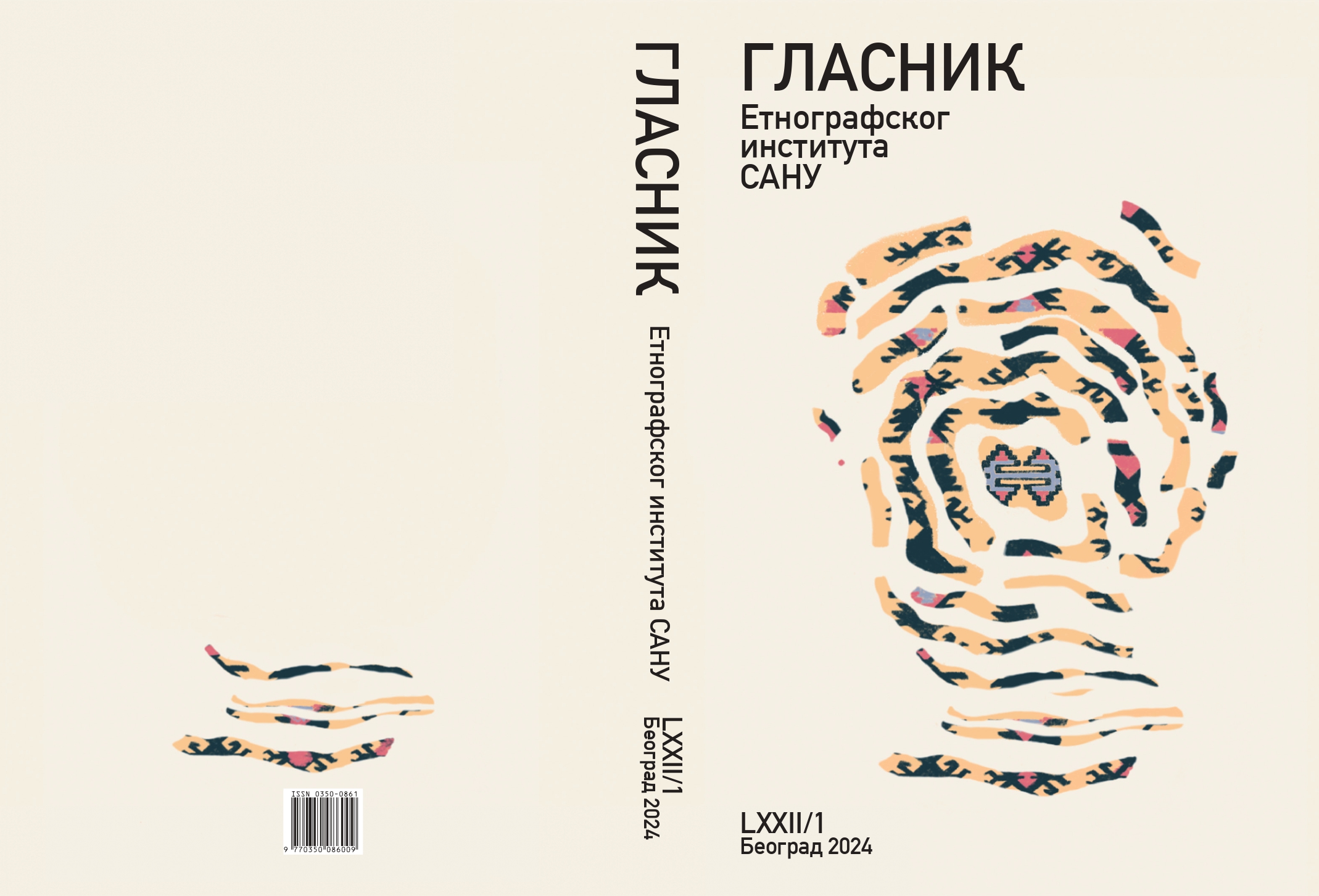
From the perspective of our time, it is difficult to guess what Zhuangzi wanted to tell us with the expression “zuo wang 坐忘”. Different angles of looking at the world give us pictures of different worlds. In the text “Zhuangzi: Oblivion and Happiness”, I will try to shed light on the various possibilities that the term “zuo wang 坐忘” offers us. In this light, the possibility opens up to understand to what extent it is the path to our happiness. At the same time, numerous philosophical questions arise: the relationship towards the body, self, dao, de, towards dream, reality, the cultivation of one’s being, wisdom, etc.
More...
The paper analyzes the development of neofeminism in Yugoslavia as a socialist and non-aligned country with self-management as the dominant mode of social organization. We set out to examine to what extent this social and political background influenced the appearance of neofeminism in the early 1960s, its development, transformations and branching out into different forms and eventual decline in the late 1980s. It is our contention that in the late-socialist culture in Yugoslavia, feminist theory was present from the 1960s to 1980s in different forms. Yugoslav female and male authors openly debated and wrote about feminist issues, they were also influenced by numerous translations of the works of feminist authors. The paper discusses two main branches of Yugoslav neofeminism: socialist neofeminism and Marxist neofeminism. In conclusion, we reflect upon the legacy of neofeminism in Serbia as a post-Yugoslav society.
More...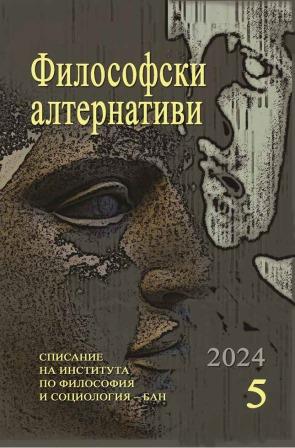
The article is an in-depth review of the origin and development of Martin Heidegger's philosophical ideas with a main emphasis on his political anthropology. The basic concepts of Heidegger's philosophical system, as well as the social and political conditions of their formation and change, are examined in detail. In the text, lines are devoted both to the influence of Heidegger's philosophy and to the evaluations of it by the philosopher's contemporaries and later researchers. The idea that the story of Heidegger's life cannot be separated from his thinking is successfully defended, especially since his political ideas or delusions have a concrete origin in the social and conceptual processes of Europe in the middle of the 20th century.
More...